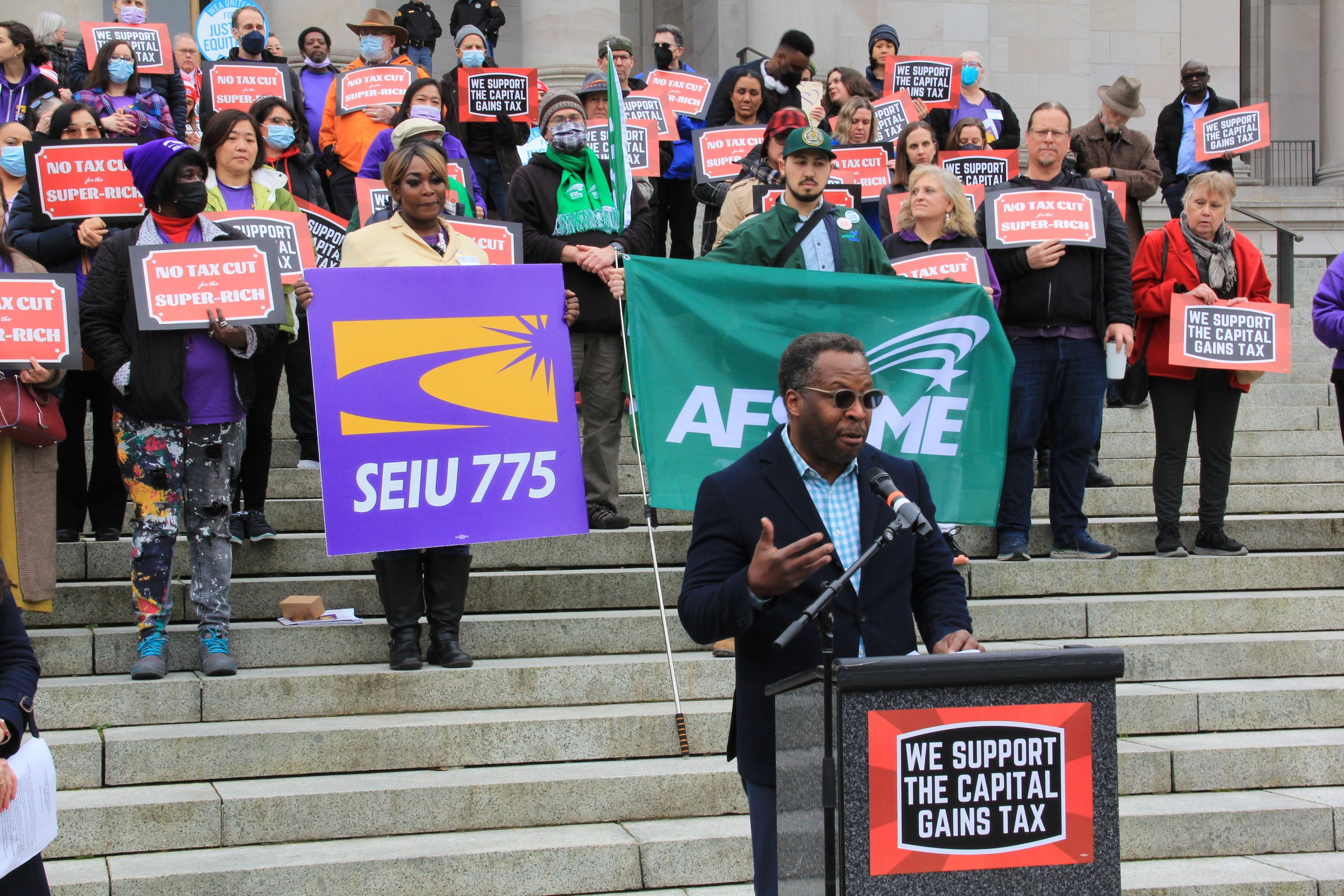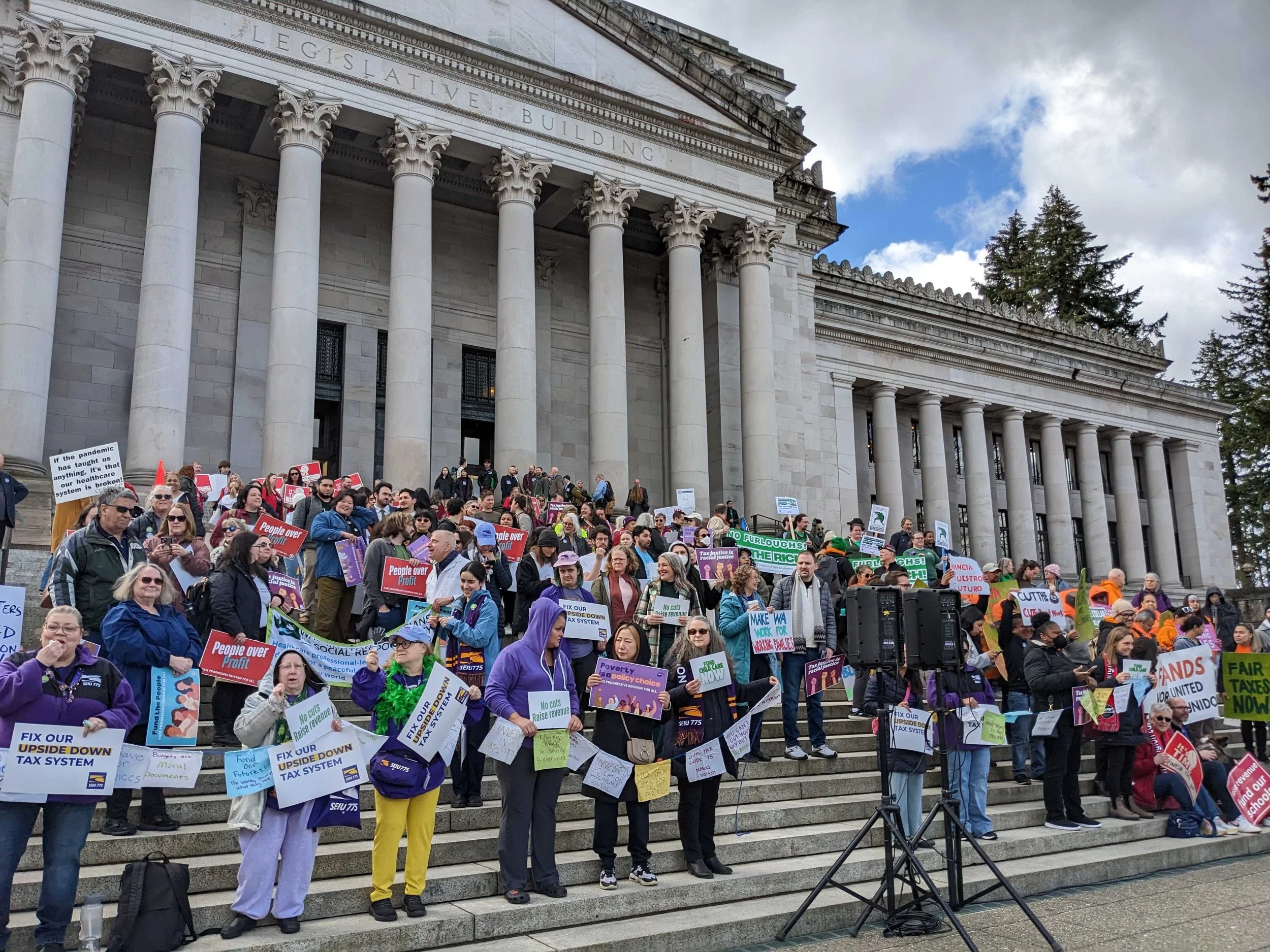
We pay our share in taxes.
So should the super-rich!
Most Washingtonians already pay our share for education, transit, healthcare, and housing.
We all contribute through state and local taxes - mostly property and sales taxes - for the public services we all depend on.
Earlier this year, legislators made tough decisions about funding schools, health care clinics, and housing, while looking out for smart spending of public resources.
But billionaires, and the politicians they’ve paid for in DC, are taking away food security, health care, and affordable utilities to fund a massive tax giveaway to the wealthiest in our country. HR 1 passed by Congress in July 2025 gives away an estimated $7 billion a year in tax cuts to the super-rich in Washington state, while taking away what working Washingtonians really need - affordable healthcare, food, and places to live.
Impacts of HR 1 on Real Washingtonians
Washington parents, kids, seniors, and small businesses are feeling the pain because billionaires, and extremist politicians in DC:
Are taking away billions from our state’s health care exchange, so now as many as 142,000 working Washingtonians are losing their health insurance or facing up to 75% higher premiums.
Ended critical utility expense credits so 75,000 families will now have to choose between paying for their utilities or food.
Cut off SNAP benefits, so now up to 200,000 more Washingtonians could be in lines at food banks and more kids are going to school hungry.
Risks billions in funding for Apple Health and Medicaid - through cumbersome and arbitrary “work requirements” that are intended to make it harder to get needed care. More than 250,000 people could lose care - forcing more Washingtonians, mostly women, to leave their jobs and care for aging loved ones and family members with disabilities.
Most immediately 30,000 refugees and asylum seekers will lose their Medicaid health benefits next October, including 3,000 vulnerable seniors and people with disabilities who rely on care every day.
Raided billions in funding from student loans and grants, student healthcare, on top of previous cuts of tens of millions in grants to Washington’s universities and colleges, so now fewer students will graduate and more businesses will have a hard time finding qualified local employees.
CHALLENGING ECONOMIC INEQUALITY
FIGHTING FOR TAX JUSTICE
BUILDING THRIVING COMMUNITIES
Washingtonians pride ourselves on being a fair and just state where we take care of each other. This is true in so many ways - but we still have a long way to go.
Washington is one of the worst in the nation when it comes to income inequality, where the rich keep getting richer and the poor keep getting poorer. We’re also the worst in the nation when it comes to our upside-down tax code. This means Washington’s mega-wealthy contribute 3% or less in state and local taxes, while people with the least wealth contribute 18% or more.
Challenging Economic Inequality
Loopholes, tax breaks, and exemptions benefit the richest people and biggest businesses in Washington. In other words, the super-rich have relied on systemic injustice for their own gain, rigging a system that pits the rest of us against each other.
The system rigged by the super-rich means:
not enough affordable housing and mental health care;
crowded classrooms and school buildings in disrepair;
inadequate health care for thousands; and
childcare deserts in at least 15 counties.
“Nick Pitsilionis owns a restaurant where his employees sometimes miss their shifts, or bring their children to work, because they cannot find affordable child care. He does what he can to accommodate them, sometimes even allowing their children to sit in the restaurant’s office while their parents work.
He says the lack of adequate child care in Pullman puts a strain on the rest of his crew, who must pick up the slack when an employee misses work because they lack good child care options.”
At the same time, Washington state is home to at least a dozen billionaires, and thousands more mega-millionaires who have benefited from our workforce, education system, and infrastructure while paying a much smaller share than the rest of us. In fact, according to our partners at the Economic Opportunity Institute, more than 17,000 Washingtonians are holding wealth in excess of $15 million.
“There are enough resources in our state that everyone in every community can have what they need. To do that, we have to keep asking our lawmakers to fix our upside-down tax code and ensure that everyone, especially the very wealthy, pay what they truly owe in taxes.” –Lu Hill, Spokesman Review
Yet every year in Olympia, we hear about revenue shortfalls as Washington’s tax code forces education advocates, housing advocates, health care providers, and many others to fight for insufficient resources needed to take care of our residents and communities.
It doesn’t have to be this way. We believe that the best way to challenge economic inequality in Washington is to make the wealthy pay their share in taxes.
Fighting for Tax Justice
We fight for tax justice because it’s good for Washington families and our state’s economy. When we do our part to reverse centuries of systemic injustice, we can build a Washington that works for all of us.
TAX JUSTICE IS GOOD FOR WASHINGTON’S ECONOMY
Right now billions more dollars should be circulating through our communities. But the super-rich aren’t spending their wealth in our communities – they’re reinvesting in the stock market, making the rich even richer.
That’s why we helped pass a capital gains tax on the stock market profits of the super-wealthy, to move money back into Washington’s small businesses and households.
“The capital gains tax is a way to resolve some of the huge racial inequities we’ve seen historically in Washington state. It’s critical to ensure that every kid in Washington has an opportunity to reach their potential.” – Dr. Stephan Blanford, Children’s Alliance
A FAIR TAX CODE FIGHTS SYSTEMIC INJUSTICE
Centuries of inequitable policies – like redlining – have forced Native American, Black, and Hispanic households to be more likely to be in the lowest income group. Our tax system furthers wealth inequality because families of color are much more likely to pay 18% or more of their incomes in state and local taxes, perpetuating systemic injustice.
“Due to generations of discriminatory public policies, too many BIPOC residents have been forced into the lower-income, higher-taxed tiers of the state population. As a result, most BIPOC groups in Washington pay higher overall state and local tax rates compared to white households and the state as whole.
While the effective tax rate for white households is 0.1 percentage points lower than the statewide average rate of 7.7%, the average rate among Black households is 0.4 percentage points higher than the rest of the state.”
Washington state’s upside-down tax code is even more racist than you think –Washington State Budget & Policy Center
Our upside-down tax code also furthers racial and economic inequality by starving Washington’s schools, hospitals, and housing funds. By denying rural, immigrant, and BIPOC communities access to well-funded resources, we push future generations further away from equality. The capital gains tax was an important step forward in our fight for tax justice, and we won’t stop fighting until our tax code is fair and just – for all Washingtonians.
Building Thriving Communities
Regardless of whether our families have been here for generations or have just arrived, we are leaving things better for those who come after us. Washingtonians believe everyone should have a fair shot at reaching their goals and pursuing their dreams.
Investing in our communities’ schools, health care, and housing is an investment in a healthier future for all of us. All of us should have the chance to reach our full potential and to be socially and emotionally ready to face the world and its challenges.
This future for our community isn’t a dream. It can be a reality. But only if we ensure lawmakers prioritize the needs of actual communities – and not the needs of special interests and some ultra-wealthy people who want to rig the tax code in their favor.
It will take time to reverse a century underfunding of Washington state’s housing, education, health care and other public services. The good news is that for every $1 spent on public services like education and health care, up to $3 is generated for local economies. Boosting jobs in local communities is an important step towards addressing Washington’s growing wealth inequality.
Invest In Washington Now is working hard to bring equity to our tax code by:
Providing working families with tax credits to help make ends meet
Defending the new capital gains tax on the mega-wealthy from attack
Asking the wealthiest in our state to pay what they owe, and
Investing more in our schools, childcare, small businesses, health care, affordable housing, and other services systemically withheld from communities of color. That’s why we helped pass a capital gains tax on the stock market profits of the super-wealthy, to move money back into Washington’s small businesses and households.
Join Our Movement
Take action now to encourage your lawmakers in Olympia to fix our unfair tax code and build thriving communities in Washington!







